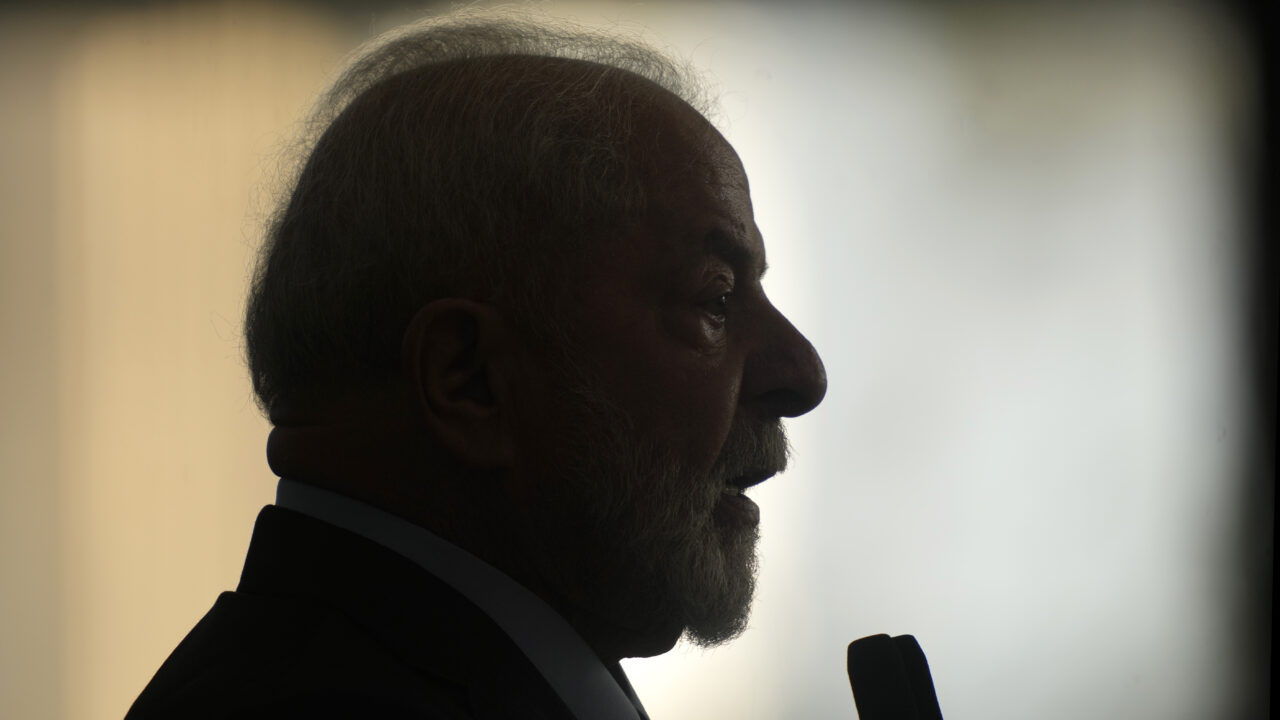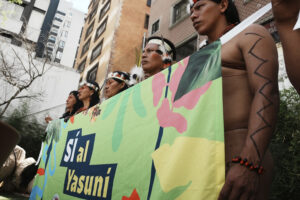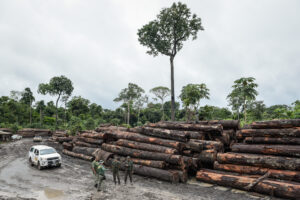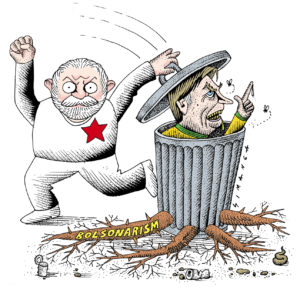Will Brazil Really Say No to Oil and Gas?
President Lula da Silva’s election brought hopes of reversing destruction of the Amazon. Will a new fossil fuel boom undermine promises of change? Brazil's President Luiz Inacio Lula da Silva makes his speech during a ceremony to commemorate Amazon Day, in Brasilia, Brazil, Tuesday, Sept. 5, 2023. (AP Photo/Eraldo Peres)
Brazil's President Luiz Inacio Lula da Silva makes his speech during a ceremony to commemorate Amazon Day, in Brasilia, Brazil, Tuesday, Sept. 5, 2023. (AP Photo/Eraldo Peres)
This article is Part II of a series in partnership with Earthworks on oil and gas impacts in Latin America. Read Part I.
With record-setting fires in the Amazon dominating headlines in recent years, the global environmental imaginary of Brazil often brings up scenes of deforestation, threats of tremendous biodiversity loss, and violent displacement driven by the cattle, forestry, and agribusiness industries. Now, on the heels of a wave of oil industry privatizations, pressure has mounted around the question of oil extraction in the Amazon. While deforestation often tops the national and international agenda, less present is the question of air pollution from the country’s oil, gas, and coal industries.
Care for the environment, however, seems to be part of Brazil’s social fabric, or what brings a lot of people together. In January 2023, President Luiz Inácio Lula da Silva returned to power on a platform of socioeconomic change and environmental protection. His appointments of Marina Silva to head the Ministry of Environment and Climate Change and Sônia Guajajara to lead the new Ministry of Indigenous Peoples were especially promising.
But a strong governmental commitment to environmental issues has been lacking. Lula has faced strong criticism for his lack of firm opposition to congressional moves that diluted the powers of both ministries, stripping them of tools to protect water resources, prevent land grabbing, and slow deforestation.
Brazil’s oil production increased in 2022 to 3 million barrels per day, mostly from its deep-water offshore pre-salt oil fields. The energy minister recently announced a projected goal of producing 5.4 million barrels per day by 2029, which would elevate Brazil to being the fourth largest oil producer in the world and lock the country into a carbon-intensive energy model. Giant corporations like Total, Equinor, and Petronas are already reaping the profits. On December 13, the day after the COP28 climate summit ended, the Brazilian National Petroleum Agency (ANP) auctioned drilling rights to 602 exploration areas, several in buffer zones of protected areas in the Amazon that would impact Indigenous and quilombola territories. The state oil company Petrobras—despite being discredited in a sweeping corruption scandal that played out between about 2014 and 2018—is now suddenly positioned to become a major corporate player regionally and globally.
Lula has faced strong criticism for his lack of firm opposition to congressional moves that diluted the powers of both ministries, stripping them of tools to protect water resources, prevent land grabbing, and slow deforestation.
Environmental protection often takes a back seat to the alleged economic benefits of extracting oil, gas, and coal, and national and international news reports rarely mention pressing environmental issues tied to these resources’ climate-heating and public health impacts. As Brazil’s fossil fuel industry eyes expansion, closer scrutiny of the consequences of air pollution from oil, gas, and coal, especially on communities living near oil and gas facilities, is urgently needed.
Petrobras suffered a major setback in May 2023 when the environmental agency IBAMA denied its proposal to explore deep water wells in the Foz do Amazonas Basin at the mouth of the Amazon River. The oil block in question, Block 59, is part of what is known as the Equatorial Margin, a string of deepwater oil reserves along Brazil’s north and northeast coast. Drilling there could have devastating consequences, including for climate warming. Dozens of civil society organizations had made the case that the Environmental Impact Assessment for the project was insufficient, failing to fully consider the socioenvironmental impact of oil exploration and drilling in an area known for its reefs and marine biodiversity.
With the backing of the Ministry of Mines and Energy, Petrobras appealed the decision. IBAMA, the Ministry of Environment and Climate Change, and the Federal Public Prosecutor’s Office have advocated for a broader impact study known as an Environmental Assessment for Sedimented Areas (AAAS), which Petrobras argues is not necessary. The final decision as to whether drilling will be allowed in this basin is likely still distant. In the meantime, it seems that Petrobras will continue to insist, and it has announced plans to start drilling in the Foz do Amazonas basin in 2024. There has already been extensive drilling in the Equatorial regions belonging to French Guiana, and Petrobras would not want to be locked out of that opportunity, according to Brazilian journalist Angelo Girotto.
While the Foz do Amazonas drilling exploration decision remains in limbo, the oil and gas industry continues to have widespread impacts throughout much of the country. At onshore and offshore facilities, emissions of methane and other volatile organic compounds that are vented, flared, or otherwise released significantly contribute to greenhouse gas and have drastic public health impacts. These emissions stem from extraction sites, refineries, oil and gas compressor and processing stations, thermoelectric plants, and steel and iron processing plants, among others. Many of the gasses are known to be linked to cancer, respiratory problems, and birth defects.
During April and May 2023, Earthworks partnered with the Brazilian environmental NGO Instituto Internacional Arayara on a tour to seven states with heavy presence of oil and gas facilities. We surveyed many facilities with an Optical Gas Imaging (OGI) camera, and staff from Arayara took water samples in and around potential contamination sites. The images reveal methane and other volatile organic compounds that cannot be seen with the naked eye. As is so often the case, the story of this pollution enmeshes with the country’s turbulent politics and economics of recent years.
Air Pollution, Privatizations, and Global Integration in the Northeast
In 2016, after the impeachment of President Dilma Rousseff installed right-wing president Michel Temer, Brazil’s government began to enact privatizations and business-friendly regulations in the oil and gas sector. The moves came not only amid a crash in oil prices but also as scandal swirled around Petrobras as a result of the expansive Operation Car Wash corruption investigations. In 2017, Shell, Exxon Mobil, and BP energy won their bids for six major coveted pre-salt offshore blocks, where deep water oil and gas reserves are locked under a massive layer of salt, complicating extraction. Other foreign companies also obtained private and public-private partnership bids for other blocks.
One of the privatization arrangements during this period was the auctioning of onshore and offshore oil exploration blocks in the northeast state of Rio Grande do Norte to the Brazilian oil and gas company 3R Petroleum. As part of the auction, exploration was swiftly approved for the Polo Potiguar block, which included Petrobras’ Potiguar Clara Camarão refinery. According to journalist Girotto, the refinery should not have been included in the auction of the exploratory block. Since the refinery plays a critical role in supplying gasoline to several of Brazil’s Northeast states, its sale should have required congressional approval, not just Petrobras’s approval.
Although 3R Petroleum is new to the scene, it rose fast despite the domination of the big oil and gas players. According to one account, the company was founded in 2010 as a bijouterie business based in Rio de Janeiro. It declared itself a petroleum company in 2014, announcing that it would prioritize production in mature oil fields, which would require low investment and secure profits. The company had little capital but was part of “revolving door” practices within Petrobras that allowed its executives to be hired by private firms with business contacts. Through these relationships, 3R invited investment from corporations like BlackRock, JP Morgan Chase, Banco do Brasil, and others, including BTG Pactual, a Brazilian investment bank cofounded by University of Chicago-trained economist Paulo Guedes. As minister of economy under President Jair Bolsonaro, Guedes nominated a former graduate school colleague from the University of Chicago, Roberto Castelo Branco, to head Petrobras in 2019. In 2020, Castelo Branco gave the go-ahead to transfer Petrobras’s exploration blocks alongside the refinery to 3R. In 2023, after leaving Petrobras two years earlier, Castelo Branco became president of 3R Petroleum’s administrative council.
As Brazil’s fossil fuel industry eyes expansion, closer scrutiny of the consequences of air pollution from oil, gas, and coal, especially on communities living near oil and gas facilities, is urgently needed.
Since 3R is a new investment company without extensive experience in the oil and gas sector, questions have arisen over its ability to effectively operate the Potiguar refinery and other facilities. According to Girotto, 3R currently has limited operational capacity. It has fired 1,200 Petrobras workers in Rio Grande do Norte and transferred another 500 workers to other locations. This creates a lot of instability for communities that have depended on the heavy presence of Petrobras in the region since the 1980s.
These developments also raise questions as to how 3R Petroleum will be able to address the extensive air pollution we witnessed in and around Alto do Rodrigues and Guamaré communities—adjacent to facilities bought by 3R Petroleum—in April 2023, when these facilities were still under Petrobras ownership. At the Potiguar refinery, we documented extensive plumes of methane and volatile organic compounds spewing from two exhaust stacks in one of the refinery’s many processing units. Nearby, in the shallow waters a few miles off of the coast of Guamaré, fishermen pointed out a pipe that they said releases the gas that can’t be filtered enough to transport in the gas pipelines that course throughout the interior of the region.
At another facility now under 3R Petroleum’s management, the Vale do Açu natural gas-fired thermoelectric plant, located near the downtown area of the rural community of Alto do Rodrigues, we filmed problematic levels of air contamination from exhaust stacks releasing methane and other gasses. In front of the plant, cattle grazed by a papaya field. Although the plant seems currently to be temporarily closed, we could not help but wonder about its ongoing socioeconomic and environmental impacts.
In nearby Ceará state, the Pecem Port is part of an export processing zone that each year handles millions of tons of cargo destined for the European Union, United States, Asia, and other destinations. One of the landmarks of the so-called “green” port is a system of several kilometers of conveyor belts that carry coal from Colombia and other places to the two local coal-fired thermoelectric plants (Pecem I and II) and to the Steel Company of Pecem (CSP).
At the time of our visit, CSP was releasing typical carbon, sulfur dioxide, and nitrogen oxide emissions. But through a FLIR thermal imaging camera, and with the naked eye, we could see that four smokestacks at the coal-burning facility were also releasing particulate matter. Particulate matter consists of microscopic ash and dust particles that can travel deep into the respiratory and circulatory systems of humans and animals and cause damage.
Indigenous communities have felt the harsh impact from these facilities in their territories and air. The Taba dos Anacé Indigenous reserve in the municipality of Caucaia, the first reservation in the state of Ceará, was created in 2018 as a form of compensation for the forced displacement of the Anacé from the lands where the Pecem Port and Industrial Complex are situated. Spanning 543 hectares, Taba dos Anancé contains 163 homes, a school, and a health clinic.
However, according to a chief of the community, the reservation has divided the Anacé—geographically, but also politically—since it is not located on their original lands. “They want to exterminate the Anacé, but what we need are public policies that for instance prohibit and remove [outside projects]. We need to have prior consultation,” the chief told us. “We have a protocol of consultation for our people, our own methodology. They don’t want to accept that we know how to map our own communities.” To preserve their lands, the Anacé are now in a constant battle with the local and state governments, private landowners, corporations, and hired security personnel.
The (Problematic) Turn to Natural Gas and Thermoelectric Plants
The privatizations also set in motion the construction of several gas-fired thermoelectric plants, including one each in the states of Piauí and Maranhão. These developments were in accordance with two laws, passed in 2021 and 2022, that mandated the government’s purchase of energy from gas-fired thermoelectric plants following the privatization of Eletrobras, the state energy company, in 2022. As argued in a 2022 environmental class action suit by the environmental rights organization Instituto Internacional Arayara against the National Agency of Electrical Energy (ANEEL) and the Brazilian government, the decision to prioritize the construction of gas-fired thermoelectric energy plants—alongside the laying of gas pipelines and opening of gas exploration fields in the Amazon and northeastern regions—may have disastrous and unnecessary consequences in Piauí and Maranhão, which include parts of what is known as the legal Amazon.
Indigenous communities in the region have been challenging the proposal to build the Portocem thermoelectric plant.
The 2021 and 2022 laws require the government to purchase 8,000 megawatts from thermoelectric plants that are to operate at a minimum 70 percent capacity for at least 15 years. In other words, the facilities are “inflexible” plants that will not be shut down even if hydropower sources—increasingly strained due to drought—are at a high capacity after rainfall. If the two planned thermoelectric plants in Piauí and Maranhão are built, Instituto Arayara argues, it would cause displacement of quilombola and Indigenous communities, spur exploration of gas in biodiverse areas, and increase greenhouse gas emissions by 74 percent. In contrast, a turn to renewable options would reduce emissions by 30 percent.
The steadfast emphasis on natural gas and opportunities for foreign investment is also palpable at the Pecém Port in Ceará. Pecém is lined up for the building of another thermoelectric plant powered by natural gas, dubbed Portocem. These new plants would arguably replace the two flexible coal-fired thermoelectric plants in the region (Pecem I and II), which at the time of our visit were turned off. According to some reports, the government is considering approving a floating gas terminal to feed gas to the new plant via a 7-mile-long underwater gas pipeline.
Since May 2023, Indigenous communities in the region have been challenging the proposal to build the Portocem thermoelectric plant. The Indigenous Council of the Anacé People of Japiman and the Indigenous Association of the Anacé People of the Planalto do Cauípe Village partnered with the Instituto Verdeluz to file an environmental class action lawsuit against the Ceará secretary of environment and the company behind the project, Portocem Geração de Energia S.A. The lawsuit argues that the approval process violated Indigenous rights by concealing the presence of Indigenous communities in the vicinity and failing to follow free, prior, and informed consent protocols. The case also claims the project underestimated the short- and long-term socioeconomic, health, water, and climate impacts that a gas-fired thermoelectric plant in the area will have.
The Northeast region is already highly prone to impacts from climate change due to difficult periods of drought. The plaintiffs have called for the project to be halted, the environmental licenses to be voided, and a new environmental impact assessment to be conducted. A final decision is still pending.
New and Ongoing Civil Society Proposals
In the face of Brazil’s turn toward an oil and gas bonanza set to deliver profits to a few and great suffering to many, civil society organizations are stepping up their demands for policy coherence and paths toward decarbonization. On November 16, a group of 61 organizations publicly unveiled a proposal for a phase out of fossil fuels. The proposed schedule outlines a reduction of exploration and flaring of fossil fuels by at least 43 percent by 2030 and 60 percent by 2035, compared to 2019 levels. The groups took the proposal to the COP28 climate summit in Dubai from November 30 to December 12, 2023, and delivered it to President Lula and authorities of the Ministries of Energy and Mines, Foreign Affairs, and Environment and Climate Change. The Petrobras union, Sindpetro, has also insisted on the potential for the company to lead in the area of renewable diesel and biofuels, announcing that this could facilitate a 70 percent reduction in greenhouse gas emissions.
In addition to lodging strong legal challenges against these projects in the Northeast, Amazon, and other regions, communities and organizations like Instituto Arayara and others are betting on the proliferation of spaces at the local and state levels to debate what a just energy transition could generate, including more equitable and participatory social and economic development around green jobs and renewable energy, the strengthening of the circular economy, and more. Instituto Arayara has held several Just and Sustainable Energy Transition Forums alongside municipal authorities, civil society organizations, entrepreneurs, and local residents in the states of Maranhao, Paraná, and others.
Other local efforts to map out alternatives include discussions on the economic and socioenvironmental potential of agroecology and agroforestry. In a region of Rio de Janeiro state dominated by oil and gas, initiatives like the XVI Social Responsibility Fair of the Campos Basin in the city of Macaé seek to better understand and raise awareness about the consequences of climate warming on oceans and lands. In this effort to remain vigilant to environmental and health impacts of big oil, communities weave their path toward a future they need, with greater care, responsibility, and ethics at its core.
Your support matters…Independent journalism is under threat and overshadowed by heavily funded mainstream media.
You can help level the playing field. Become a member.
Your tax-deductible contribution keeps us digging beneath the headlines to give you thought-provoking, investigative reporting and analysis that unearths what's really happening- without compromise.
Give today to support our courageous, independent journalists.






You need to be a supporter to comment.
There are currently no responses to this article.
Be the first to respond.